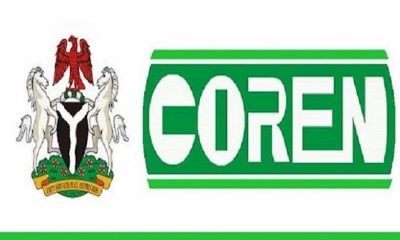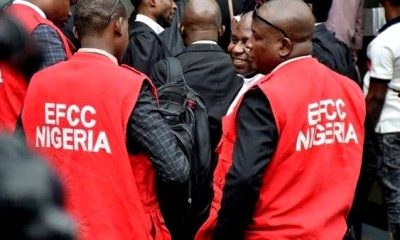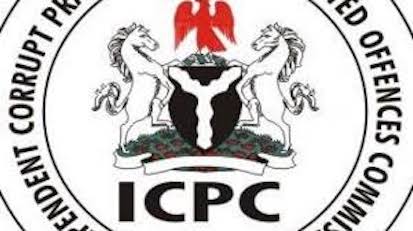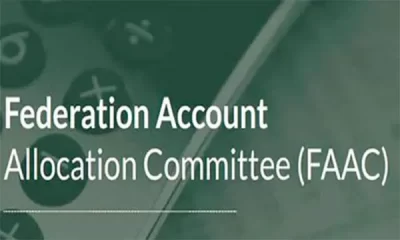NEWS
NSIO, ICPC Mount Campaign Against Corruption

By Tony Obiechinja, Abuja
The National Social Investment Office (NSIO) and the Independent Corrupt Practices and other Related Offences Commission (ICPC) on Friday, formally flagged – off collaboration to check corruption in the implementation of the National Social Investment Programmes
The Media Launch of the NSIO-ICPC partnership, held at the State House Auditorium in Abuja, was performed by the Minister of Humanitarian Affairs, Disaster Management and Social Development, Hajia Sadiya Farouq.
The highpoint of the event was the unveiling of Toll-Free Whistle Blower Hotline—0800-call-ICPC (0800-2255-4272) by the Minister assisted by the Special Adviser to the President on Social Investment, Mrs Maryam Uwais and ICPC Chairman, Prof Bolaji Owasanoye.
Farouq said that she was excited to be part of the laudable initiative, which aligned with the vision of President Muhammadu Buhari’s administration to rid Nigeria of corruption and other forms of sharp practices.
She said it was a fight against people who wanted to sabotage the effort of the Federal Government in its aim of reducing extreme poverty that impeded on Nigeria’s Socio-Economic and Political development.
“This renewed partnership between the NSIO and ICPC, as well as other anti-graft and security agencies that have been working in close concert with the Programme underscores commitment, zeal, passion and inter-agency cooperation.
“It is towards achieving the desired results in the ongoing campaign against corruption as championed by the President himself.“Recall that on assumption of office in 2015, President Buhari introduced the NSIP in fulfillment of a critical part of the All Progressives Congress (APC) campaign promise which endeared majority of Nigerians to the President and our party.“The objective of the Programme is principally to reach the poor and vulnerable Nigerians, following the growing rate of poverty and unemployment in the country in the years preceding the current democratic dispensation.“Consequently, the NSIP was set up in 2016 to coordinate and supervise all components of the social protection programme.
“They are: the National Home Grown School Feeding Programme (NHGSFP), Government Enterprise and Empowerment Programme (GEEP), N-Power and the National Cash Transfer Programme (NCTP).’’She said that she was pleased that all pthe programmes had recorded resounding successes, directly impacting the lives of no fewer than 12 million Nigerians.
According to her, there are several millions of indirect beneficiaries whose living standards have significantly improved through the value chain created by the various Social Protection Initiatives.
She said that there were over 548,000 graduate and non-graduate beneficiaries under the N-Power; while Home-Grown School Feeding Programme had over 9.8 million beneficiaries.The minister said that the Government Enterprise and Empowerment Programme (GEEP) being coordinated by the Bank of Industry had over 2.1 million beneficiaries from TraderMoni, MarketMoni and FarmerMoni.
She said also that the Conditional Cash Transfer initiative had almost 400,000 beneficiaries, with over 1.1 million households captured on the National Social Register.Farouq said that with the successful outcomes of people-oriented programmes and policies government was already looking at taking 100 million Nigerians out of the poverty line in the next 10 years.
“Incidentally, this target set by the president comes at a time when most of the programmes and agencies saddled with the mandate of addressing the plight of Nigerians who are way below the poverty line, have been moved to the newly-created Ministry of Humanitarian Affairs, Disaster Management and Social Development, for synergy and close supervision.“To achieve the task of lifting 100 million Nigerians out of poverty in the next 10 years in line with the president’s directive, we must as a ministry ensure that all our poverty alleviation strategies and programmes remained strengthened.
“They should be devoid of infractions that could undermine ongoing efforts to empower our poor and vulnerable citizens.
“This is why this collaborative engagement between NSIO and ICPC is crucial as it aims to prevent and eliminate third party corruption in the National Social Investment Programme.’’
Earlier in her remark, Mrs Maryam Uwais, the Special Adviser to the President on the Social Investment Programmes, said she was delighted that NSIO was getting ICPC publicly involved in preventing malpractice in the implementation of NSIP.
She said that the NSIO would not tolerate people at the other end being extorted, intimidated and defrauded in the process of getting their stipends.Uwais said that Buhari had directed that the NSIP be extended to Nigerians no matter their political affiliations.On his part, ICPC Chairman, Prof. Bolaji Owasanoye, commended the institutionalisation of the NSIP and pledged the commission’s total support in checking corrupt practices in the implementation of the programmes
NEWS
UCare, ECOWAS Extend Lifeline to Displaced Families in Abagana Camp

By David Torough, Abuja
UCare Nigeria, with support from the ECOWAS Peace Fund, on Friday expanded its humanitarian pilot programme to the Abagana Internally Displaced Persons (IDP) camp in Makurdi Local Government Area of Benue State.
The initiative, which began at Ichwa camp, is designed to provide both health and non-health support across three camps.
According to UCare’s Benue State Team Lead, Mr.
Terna Nyityo, the intervention targets 1,000 individuals in each camp with medical services, dignity kits for adolescents, delivery kits for pregnant women, solar-powered boreholes, safe drinking water, and toilets.He added that members of surrounding host communities, who are also burdened by displacement, are included in the programme.
Nyityo noted that although the camp’s population had reduced as some displaced persons attempted to return to farming, renewed attacks were driving many back into the facility. “We are recording more people in the camp again,” he explained.
Commissioning the newly installed borehole and toilets on behalf of the partners, Abagana camp manager and BSEMA representative, Ms. Shipinen Unande, described the intervention as “a massive development” that would ease water supply challenges and improve sanitation.
However, she expressed concerns over deteriorating shelters, food shortages, lack of farmland, and the absence of essential drugs at the camp’s pharmacy.
According to her, some families are forced to sleep under staircases while others dig up tree roots for firewood.
Unande further appealed for scholarships and skill-acquisition programmes to empower young people in the camp, saying: “We have vibrant youths who can work if given the opportunity.”
Also speaking, the camp chairman, Mr. Azende Festus, lamented worsening living conditions caused by insect infestations affecting many households.
Beyond infrastructure, UCare also distributed mosquito nets, dignity kits, and mama kits, and conducted medical outreach for children, pregnant women, and breastfeeding mothers.
The ECOWAS-supported initiative aims to reach 3,000 displaced persons across three camps in Benue State by the end of August, providing health care, safe water and sanitation facilities, nutritional supplements for children, and other essential humanitarian aid.
NEWS
Julius Berger Joins Forces With FRIN, NCF to Plant 20,000 Trees at FCT Army Cantonment

By Mike Odiakose, Abuja
In a landmark move towards environmental sustainability, engineering construction company, Julius Berger Nigeria Plc, in partnership with the Forest Research Institute of Nigeria (FRIN) and the Nigerian Conservation Foundation (NCF) has successfully carried out a major tree-planting exercise at the Muhammadu Buhari Cantonment, Abuja.
The initiative, which saw the planting of over 20,000 indigenous tree seedlings, marked a significant contribution to Nigeria’s fight against deforestation, climate change, and biodiversity loss.
It also reaffirmed Julius Berger’s broader commitment to responsible environmental stewardship and sustainable development.
The effort, which was a collaborative blend of expertise and shared vision, saw the FRIN leading the technical aspects of species selection and ecological suitability while NCF brought in decades of conservation experience and community engagement, with Julius Berger providing the funding, and coordination support.
Speaking at the event, Dean of the Faculty, General Research at the Nigerian Army Heritage and Future Centre, Major General J.Y. Maina, representing the Chief of Army Staff, Lt. Gen. O.O. Oluyede underscored the strategic importance of environmental protection in national security
He said, “today’s exercise is a practical demonstration of our shared recognition that environmental protection is inseparable from national security. Climate change, desertification, and environmental degradation pose long-term threats to our country’s stability. Tree planting is not just an ecological necessity; it is a strategic investment in our collective future.”
Even as he praised Julius Berger’s leadership and commitment, calling the collaboration “a shining example of how the military, government institutions, and the private sector can work together for sustainable development.”
The Zonal Coordinator, Nigeria Conservation Foundation, Garba Boyi, who ably represented the Director-General, Dr. Joseph Onoja of the NCF said the Foundation is a non-governmental organization, adding that the organisation’s focus and mandate is actually in the area of biodiversity conservation and sustainable development in Nigeria.
“For us to achieve that, we have developed or come up with an initiative, which we call it Green Recovery Nigeria. This is an initiative that is meant actually to salvage the situation in which our vegetation happens to be. Because going by the statistics, we have less than 10% of our vegetation cover left.
“So we as an organization, feel the need to contribute our quota to complement the government activity by planting trees.”
In commending Julius Berger’s effort in the tree planting exercise, he said, “I want to use this opportunity to thank our sponsors, Julius Berger for being a huge part of this initiative. This is really a big feat and we are sincerely grateful to the company for giving us the funds and really excited that Julius Berger gets to be on this journey with us.”
The Chief Executive of a key stakeholder in the exercise, Ceed Africa Limited, Dr. Okechukwu Ogbonna, thanked Julius Berger for the funding support for the exercise even as the Director, Forestry Research Institute of Nigeria, Prof. Zacharia Buba Yadura appreciated the leading construction company for its collaborative effort, saying, “we didn’t have sponsors or partners, and Julius Berger decided through the NCF to be a partner of this Initiative. We are grateful to Julius Berger for joining us on this vital journey.”
The event brought together stakeholders from the public, private, and military sectors, among which were: the Minister of Environment, Mallam Balarbe Abbas Lawal ably represented by the Permanent Secretary, Minister of Environment, Mahmud Adam Kambari, the representative, Chief of Army Staff, Maj. JY Maina, Dean Faculty of Research , NAHFC, the Director of Coordination and Linkages, NAFHC, Major General O. Nwachukwu, The Corp Commander, Nigerian Army Women Corps, Brig. Gen. MI Amatso, the Director General, FRIN; Prof. Zacharia Buba Yadura, Zonal Coordinator, NCF, Garba Boyi, and the Liaison Officer, Forestry Research Institute of Nigeria, Dr. Christopher Nwadike.
The Julius Berger delegation to the Tree Plantiong Ceremony include Emmanuel Isibor, Daniel Isichei, and Uzoma Olivia.
End
NEWS
FG, States, LGCs Share N2.001trn July, 2025 Revenue
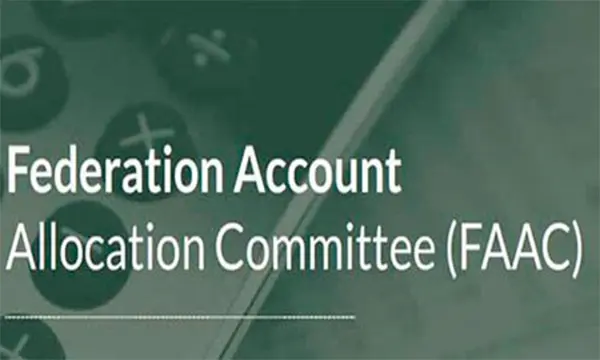
By Tony Obiechina Abuja
A total sum of N2.001 trillion, being July 2025 Federation Account Revenue, has been shared to the Federal Government, States and the Local Government Councils. The revenue was shared at the August 2025 Federation Account Allocation Committee (FAAC) meeting held in Abuja.
The N2.001 trillion total distributable revenue comprised distributable statutory revenue of N1,282. 872 trillion, distributable Value Added Tax (VAT) revenue of N640. 610 billion, Electronic Money Transfer Levy (EMTL) revenue of N37.601 billion, Exchange Difference N39.745 billion. A communiqué issued by the Federation Account Allocation Committee (FAAC) indicated that total gross revenue of N3,836.980 trillion was available in the month of July 2025. In a statement by Bawa Mokwa, Director of Press and Public relations of the OAGF, on Friday, total deduction for cost of collection was N152,681 billion while total transfers, interventions, refunds and savings was N1,683.471 trillion. According to the communiqué, gross statutory revenue of N3,070.127 trillion was received for the month of July 2025. This was lower than the sum of N3,485.235 trillion received in the month of June 2025 by N415.108 billion. Gross revenue of N687.940 billion was available from the Value Added Tax (VAT) in July 2025. This was higher than the N678.165 billion available in the month of June 2025 by N9.775 billion. The communiqué stated that from the N2,000.828 trillion total distributable revenue, the Federal Government received total sum of N735.081 billion and the State Governments received total sum of N660.349 billion. The Local government Council received N485.039 billion, while the sum of N120.359 billion (13% of mineral revenue) was shared to the benefiting State as derivation revenue. On the N1,282.872 trillion distributable statutory revenue, the communiqué stated that the Federal Government received N613.805 billion and the State Governments received N311.330 billion. The Local Government Councils received N240.023 billion and the sum of N117.714 billion (13% of mineral revenue) was shared to the benefiting States as derivation revenue. From the N640.610 billion distributable Value Added Tax (VAT) revenue, the Federal Government received N96.092 billion, the State Governments received N320.305 billion and the Local Government Councils received N224.214 billion. A total sum of N5.640 billion was received by the Federal Government from the N37.601 billion, The State Governments received N18.801 billion and the Local Government Councils received N13.160 billion.From the N39.745 billion Exchange Difference, the communiqué stated that the Federal Government received N19.544 billion and the State Governments received N9.913 billion. The Local Government Councils received N7.643 billion, while the sum of N2.643 billion (13% of mineral revenue) was shared to the benefiting States as derivation revenue. In July 2025, Petroleum Profit Tax (PPT), Oil and Gas Royalty, Electronic Money Transfer Levy (EMTL) and Excise Duty increased significantly while Value Added Tax (VAT)and import Duty increased marginally. Companies Income Tax (CIT) and CET Levies recorded decreases.
